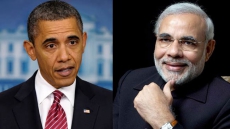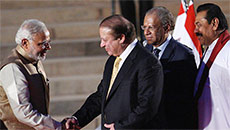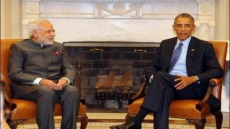It is difficult, almost impossible, to envisage an early negotiated ceasefire to put an end to the unconscionable carnage in Gaza. US Secretary of State John Kerry has been working hard, but with his hands tied. President Obama has spoken more than once to Prime Minister Netanyahu on the need for a cease-fire, but always deferentially.
In his public statements, President Obama starts with an endorsement of Israel's right to self-defence in a manner implying that Israel alone has that right, and not the Palestinians. US gives enormous support to Israel, financially, militarily, and diplomatically. One might have expected that such support would enable the US to have some influence on Israel. But, the truth is that the more the US gives, the more Israel's clout to influence US policy, and the less the US's influence over Israeli policy.
Students of international relations cannot find another instance of such an asymmetrical relationship between the recipient and the giver. Hence, the principal cause of the delay in arranging for a ceasefire to be followed by negotiations is the lack of leverage of the US vis-à-vis Israel.
The second cause for the delay is that Egypt under President Al Sisi does not want to talk to Hamas and wants to see it weakened, and, if possible, destroyed. This is the sea change between 2014 and 2012 when Egypt under Morsi was able to talk to both Israel and Hamas and arrange for a cease-fire. The ceasefire proposals put out a few days ago by Egypt were not formulated in consultation with Hamas. Obviously, Egypt knew in advance that its proposals would be rejected by Hamas. It was only playing a game. Egypt has closed the Rafah border with Gaza, causing enormous suffering to the Gazans who find themselves in a prison with Israel and Egypt holding the keys to the doors.
The third cause for the delay is that Israel does not want to call a halt to its ground operations without claiming success in a manner that is convincing to the Israeli public. It argues that Israeli Defence Forces (IDF) need more time to complete their military mission.
Reflection shows that the argument is not convincing. Rockets continue to be sent towards Israel and there is no reason to believe that the IDF (Israeli Defence Forces) will ever be able to take out the last rocket or the last launching facility. Nor will the IDF be able to kill off all Gazans who can make rockets. Israel knows all this.
Another argument or excuse for continuing with the ground operation is that Gazans have been digging tunnels into Israel and that it wants to locate and destroy all the dug tunnels. The IDF might or might not succeed. But, once again, Hamas will be able to dig new tunnels after the ceasefire unless Israel re-occupies Gaza.
The US has so far failed to use its trump card. When a rocket fell near the Ben Gurion International Airport, flights from the US and Europe to that airport were suspended. Israel reacted sharply and the flights were resumed. Why did the US and European Union give in without requiring Israel to agree to a ceasefire? The simple answer is lack of political will to be assertive vis-à-vis Israel.
John Kerry met in Cairo with his counterparts from Qatar and Turkey, two countries that have some influence on Hamas. Egypt would have resented Kerry's meeting and the Qatari foreign minister went out of his way to say that there was no move to undermine Egypt's role. Since one of the key demands of Hamas is the re-opening of the Rafah border, Egypt can always prevent a deal.
Iran has called for a meeting of the NAM's Group on Palestine next week in Tehran. India is a member of that group. A meeting at the level of Permanent Representatives to the UN has already taken place in New York. So far, Hamas has gained politically, though at an enormous cost in terms of human lives and misery. The resistance against Israel is getting reunited. Because it is not supporting the government of President Basher al Assad in the many-layered civil war going on in Syria, Hamas had to move its head office from Damascus to Doha.
It appears for the time being that a negotiated ceasefire is unlikely. Such a ceasefire entails negotiations after the ceasefire has come into force and Israel is unlikely to agree to negotiations with Hamas directly or obliquely. As a matter of fact, Israel's policy objective of politically weakening Hamas has boomeranged.
When Hamas won an election in Gaza and took over government there, instead of trying to work with that government, Israel tried to strangle it by imposing an economic blockade that finally compelled Hamas to leave office and to patch up with Fatah on terms rather humiliating. Once again, if Israel were serious about finding a negotiated resolution to its differences with the Palestinians, it could have agreed to serious negotiations under the mediation of John Kerry. Instead, Israel decided to strike at Hamas and the kidnapping followed by murder of three Israeli boys was taken as an excuse. It will be remembered that Israeli police have told BBC that Hamas had nothing to do with the abduction or murder.
Brazil has recalled its ambassador from Israel. The UK has stated that Israel is losing international support. The most likely scenario is that Israel might unilaterally announce a ceasefire along with "a mission accomplished" claim; Hamas will reject the ceasefire, and continue to send rockets for a while to claim victory; Israel will have the option to "show restraint" and the rockets will cease for the time being.






